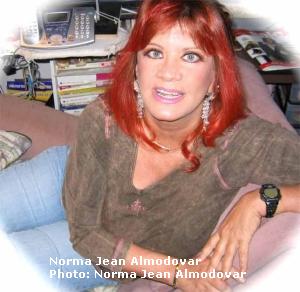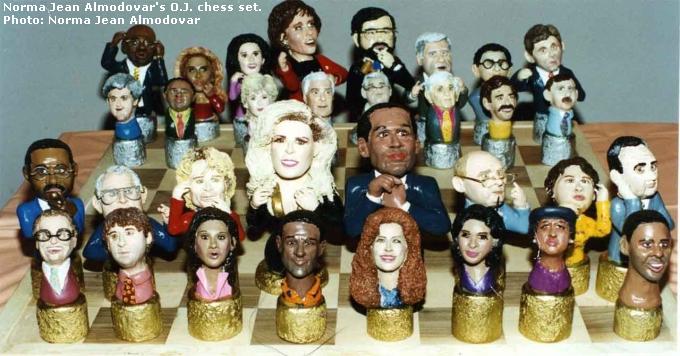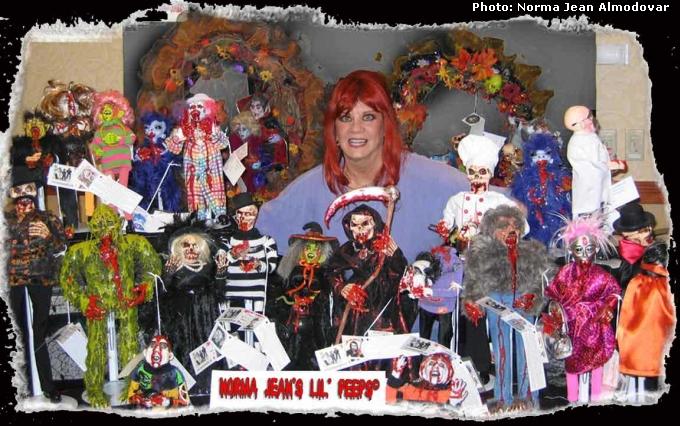NORMA JEAN ALMODOVAR -- COP
TO CALL GIRL ... TO ARTIST
by Angela Keaton, guest contributor.
[May 6, 2008]
 [HollywoodInvestigator.com]
I interviewed Norma Jean Almodovar, the LPC's 1986 candidate for Lt. Governor,
whose artwork appears at festivals throughout the U.S. Her books include From
Cop to Call Girl, and the forthcoming Cops,
Politicos, Preachers and Hos -- A History
of Commercial $ex $candals in America. [HollywoodInvestigator.com]
I interviewed Norma Jean Almodovar, the LPC's 1986 candidate for Lt. Governor,
whose artwork appears at festivals throughout the U.S. Her books include From
Cop to Call Girl, and the forthcoming Cops,
Politicos, Preachers and Hos -- A History
of Commercial $ex $candals in America.
AK: What's your artistic
training and history?
NJA: Self-taught. My mother's
mother was a minor artist in her day. Her paintings hung in relatives'
homes. I vaguely remember seeing them in public buildings as well.
All my 13 siblings and I
were
encouraged to develop our artistic talents. I didn't develop sculpting
skills until I had the "opportunity" to spend 18 months in a California
institution. Because I knew my way around a canvas, I was assigned to the
art studio at the California Rehabilitation Center in Norco. For the first
time in my life, I had access to a kiln and sculpting materials. When in
the art studio, whether working on my own creations or teaching other inmates,
I "escaped" my captors. I could create art.
I don't recommend going to
prison to develop one's abilities. But if the government is going to extract
time from your life for questioning their right to control you, then turn
it into something positive.
AK: You and your husband,
an actor, were influenced by Ayn
Rand. Given the centrality of art to Rand's work, what moral principles
guide your work? How can art promote the freedom movement?
NJA: My husband was an architect
who studied with Frank
Lloyd Wright. He was fortunate to have met Rand and be part of the Objectivist
Movement. From the time I met him, he encouraged me to develop my talent.
Art -- writing, music, everything
creative -- can touch the hearts and minds of others. While I've always
created for my own enjoyment first, I've used art to express my belief
in freedom, and as satirical commentary on the so-called justice system.
During the OJ
Simpson trial, I sculpted a chess set with the players from the trial.
My point was that the justice system is nothing but a game played by attorneys,
and whomever has the cleverest strategy wins, regardless of truth or facts.

Heidi
Fleiss's trial was ongoing at the same time. I attended it every day.
Fleiss was convicted. OJ was acquitted. Fleiss went to prison, not for
harming anyone, but for employing the principles of capitalism.
Liberal screenwriters have
embedded films and TV shows with socialist philosophy for decades. Freedom
lovers must finance more freedom-themed films -- which can be romantic,
stirring, and funny as they illuminate -- because the screen seems to have
the greatest influence on the public.
Unfortunately, other art
forms require media attention for success, and the media doesn't focus
on artists who aren't "one of them" in spirit. How to overcome this media
bias, I haven't a clue. I've only gotten significant media attention for
my sex work. I've been ignored as an artist. The media can't fathom that
a prostitute could be a "legitimate" artist or writer.

AK: The Libertarian Party's
image
is of men working in computers and engineering. Yet many libertarians are
artists. How can we change our image?
NJA: Sex workers suffer the
same problem. We're thought incapable of doing anything other than spreading
our
legs. See how the media and music industry treated Ashley Dupre, who was
the downfall of NY Governor Spitzer. When they learned she was pursuing
a career as a singer and composer, her talent was questioned. A scornful
(female) record company executive disdainfully said that anyone who signed
Dupre to a recording contract shouldn't be in the music industry.
Whether or not Dupre has
talent should be decided by consumers.
Art can reach where reason
cannot, touching those not rationally-inclined. We must overcome the resistance
of intellectually focused libertarians whose sole pleasure seems to be
debating Robert's
Rules of Order. We must stress our touchy-feely artistic sides, to
enlighten emotionally-inclined people about liberty.
We need art festivals, concerts,
poetry readings showcasing the work of talented libertarians. We needn't
say the participants are libertarians up front. We should offer a good
time along with information about the artists, including their belief in
freedom.
I don't suggest an art festival
just for libertarians; that's preaching to the choir. Film festivals such
as Sundance don't proclaim their belief in more government, more taxes,
more laws -- the selected films do that.
AK: In addition to being
a wife, artist, and libertarian, you're a prominent sex worker rights advocate.
What role has art has played in your fight?
NJA: Many of my colleagues
used
their sex work to fund their artistic pursuits. Not many people enjoy living
as "starving artists." The wages of sex care providers beats earning minimum
wage while waiting for one's art to be discovered.

In 1997, I co-chaired and
co-sponsored the International Conference on Prostitution (ICOP), featuring
an exhibit of sex workers' art from around the world. Originally, this
exhibit was intended -- by the CSUN academics -- only for conference attendees.
But I realized that many people would never otherwise have the chance to
meet a sex worker in a non-threatening environment. So I insisted on opening
the exhibit to the public.
Our exhibit was in the "Onion"
Church -- a Unitarian Universalist Church. The response was overwhelming.
All sorts of people came.
Sex workers must change focus
on how to reach people. I've been the executive director of the political
organization COYOTE L.A. for many years. Our focus was to rationally demonstrate why the laws were
wrong and needed changing. Unfortunately, prostitution is an emotional
issue. People weren't hearing us.
In 1997 a colleague and I
founded ISWFACE.(International
Sex Worker Foundation for Art, Culture and Education), a nonprofit 501
(c)3 organization that lets us raise money and offer tax deductions. Our
sex worker artwork dispels the myths, stereotypes, and lies about us in
a non-threatening environment. In 1998 we held our first major fundraiser,
"Ladies of the Evening...at the Improv," with musically and comedically
inclined "hos."
ISWFACE also provides information to media, students, researchers, and others as
the "Education" part of our mission. To change the laws, people must see
prostitutes as human beings, with talents and skills, and understand the
waste of time and money to imprison us for selling what we can legally
give away.
Unfortunately, our chief
benefactor died in 2003, and we've since been financially struggling. We
pay no salaries, but money is needed for our website, phones, exhibits,
and my college lectures to future voters. My message isn't just that prostitution
should be decriminalized; it's that we own our bodies and the government
should leave consenting adults alone, period.
Copyright 2008 by Angela Keaton.
|
